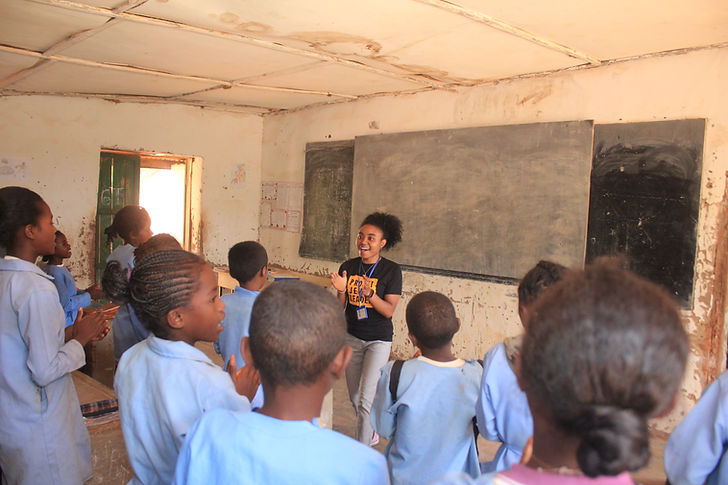
Key Results
We invest in rigorous evaluations and participatory research to understand the depth and breadth of our impact.
Equipping Young Adolescents to Thrive
Adolescence is a challenging and critical time. Young people rarely get the information and support they need — especially in rural Madagascar. We're filling this gap.
Our program has built adolescents’ knowledge, self-esteem, and leadership skills, while improving their access to socio-emotional and health support services.
Knowledge
95%
of 6th grade girls in PJL schools know they can go to school when they have their period, compared to only 59% of girls in comparison schools (2023).
86%
of 8th grade students who had participated in our course in the past two years said they knew what to do if they experienced violence, compared to 61% who did not have the program in earlier grades (2023).
Students receiving PJL's program reported a significant improvement of
31 percentage points
in their fertility knowledge (disagreeing with the statement “A girl cannot get pregnant the first time she has sex”) using a difference-in-difference analysis with a comparison group (2019-2020).
Attitudes & Behaviors
Students receiving PJL's program reported a significant improvement of
19 percentage points
in their attitudes towards intimate partner sexual violence (disagreeing with the statement “It is not a problem to sometimes force a partner to have sex”) using a difference-in-difference analysis with a comparison group (2022-2023).
Students receiving PJL's program reported a significant improvement of
47 percentage points
in their gender-equitable attitudes, disagreeing with the statement "A man should have the final word about decisions in his home", after one year of participating in PJL's program, with equal improvement among both girls and boys (2021-2022).
Students receiving PJL's program reported a significant improvement of
51 percentage points
in their gender-equitable attitudes (disagreeing with the statement "Changing diapers, giving a bath, and feeding kids is the mother's responsibility") after one year of participating in PJL's program, with equal improvement among both girls and boys (2021-2022).
Support, Access to Services, and Agency
68%
of 8th grade students at PJL schools believe that they could refuse sex with a partner if they were not ready, compared to only 37% at comparison schools. (2023)
91%
of 8th grade students at PJL schools have discussed puberty and bodily changes with an adult, compared to only 61% of students in comparison schools. (2023)
96%
of 6th grade girls at PJL schools said they would feel brave to tell their parents if they had a problem, as compared to 80% of girls at comparison schools. (2023)
A Ripple Effect
The multi-faceted impacts of our program go beyond the individual student. Our Educators are:
Dynamizing school culture.
With a PJL Educator, school has become more fun. Students, and even other teachers, are more engaged. Students share that school feels safer, and girls report feeling more included and respected.
Improving academic performance.
Our program has increased students’ motivation, attendance, and achievement at school across all of their subjects, not just their class with the PJL Educator.
Inspiring other teachers.
Teachers of other subjects are inspired by our Educators’ enthusiasm and pedagogical skills. Principals report fewer teacher absences and greater willingness to try student-centered teaching approaches.
Re-engaging parents in education.
Parents say they see more value in sending their children to school when there is a PJL Educator. They feel a greater sense of ownership over their children's education.
Strengthening family relationships.
Students and parents feel more comfortable communicating openly with each other, particularly across gender lines, after our program.
Increasing the value of rural public schools.
Principals and parents feel their school has increased in quality and value after partnering with PJL. They report that this has led to higher rates of student attendance and retention.
PUBLISHED RESEARCH
Our qualitative, retrospective evaluation in Sex Education
We conducted a retrospective, qualitative evaluation to explore how former participants assessed our CSE program's influence on their behaviors and lives. Our peer-reviewed article about the study was published in the leading international journal Sex Education.
O’Keefe, S., Raonivololona, M., Ramarosandratana, M., Anjarasoa, T., & Leeson, L. (2024). “My life would not be the same”: A qualitative, retrospective evaluation of the post-programme outcomes of an in-school comprehensive sexuality education programme in Madagascar. Sex Education.
Our Human-centered design research study in PLOS ONE
In collaboration with researchers from the University of Pittsburgh School of Public Health, we conduced a two-phased study using participatory approaches and qualitative Human-centered Design (HCD) methods to explore the multi-level, spillover impacts of our CSE program. Our findings are published in a peer-reviewed article in PLOS ONE.
Baumann, Sara E., Leeson, L., Raonivololona, M., & Burke, Jessica G. (2024). Exploring the multi-level impacts of a youth-led comprehensive sexuality education model in Madagascar using Human-centered Design methods. PLOS ONE.
Using Collaborative Filmmaking for participatory research — published in Springer Nature
Using Collaborative Filmmaking – a participatory research method developed by our partners Drs. Sara Baumann and Jessica Burke from University of Pittsburgh School of Public Health – we wanted to understand how PJL's CSE Educators create community support for their work in Madagascar. We uncovered a ton of insights, and the filmmaking process itself turned out to be just as fascinating, revealing even broader impacts, particularly on our emerging filmmakers...
Our findings are published in Research Involvement and Engagement in Springer Nature.
Burke, Jessica G., Argawal, A., Raonivololona, M., Anjarasoa, T., Leeson, L., & Baumann, Sara S. (2025). “When I finished my film, I realized that people really needed me there”: the transformative power of Collaborative Filmmaking. Res Involv Engagem 11, 5.
Learn More about How We Measure Impact
We're pretty nerdy about M&E. Continuous learning and improvement has been core to our work since the very beginning. Our impact evaluations and research conducted to date include repeated internal, quasi-experimental program outcome evaluations (pre-post); a 2021 human-centered design study with the University of Pittsburgh (peer-reviewed and published in 2024 in PLOS ONE); and a 2022 retrospective qualitative evaluation (peer-reviewed and published in 2024 in Sex Education).





